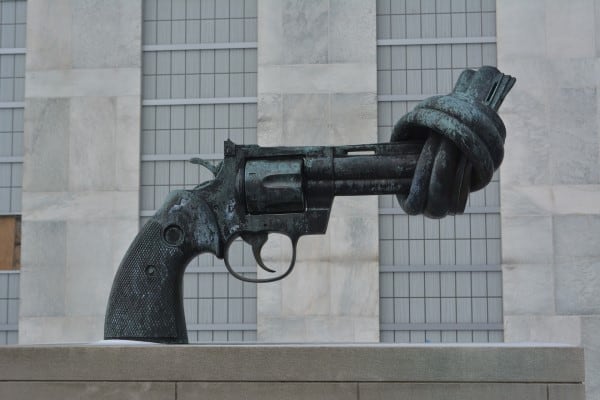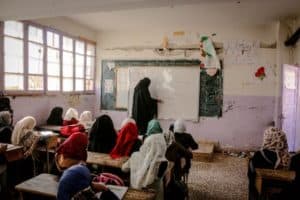This page contains affiliate links. This means if you a follow a link and make a purchase, at no additional cost to you, Humanitarian Careers will receive a commission. Thank you for supporting the site.
The United Nations is one of the most recognisable international organisations in the world. Founded in 1945 in the aftermath of World War Two, it’s mandate is to bring nations together to work towards global peace and security. We all have an idea of what the UN does, but many don’t question how much power it actually has? And how it uses it?
The United Nations can have significant global power; however, its authority is limited by member states. Although the UN can make resolutions, it is for member states to implement them. If they choose not to, the United Nation’s power is curtailed.
Now we have an overview of how powerful the United Nations is, let’s look a bit deeper at the UN’s authority, where it gets it from and how it uses it.
Is the United Nations A Powerful Organization?
When considering if the United Nations is a powerful organization, and how much authority it has, there are three main factors to consider:
- The United Nations only has power within the areas of its mandate
- The UN can only use its power when directed to by member states
- The UN has no capacity to enforce its decisions, member states must take action on its behalf
These three factors are crucial to understanding the authority the UN has globally. Let’s take a quick look at each one…
The mandate of the United Nations is to strive for global peace and security. It aims to create a forum where countries can resolve their disputes without resorting to conflict. It also runs a range of agencies that aim to help countries develop and assist communities to recover from crises.
In the areas of international peace and security, human development and crises response, the United Nations has significant power. It is the leading international organisation that directs global responses to conflicts, humanitarian crises and assists to low- and middle-income countries in development. However, outside of the areas of its mandate, the UN has essentially no authority.
On to the second point… the UN’s power is entirely controlled by member states. If the governments of member states do not wish for the UN to intervene the UN has no authority to do so on its own. This hugely reduces the UN’s ability to make decisions or take actions.
Finally, as well as the UN’s decisions being controlled by member states, resolutions made by the UN must also be complied with and enforced by member states. This essentially limits the UN’s power to providing recommendations and the real authority lies with the governments of member states to take action in-line with what the UN suggests… or not to.
Is the UN The Most Powerful Organization in The World?
Now we know how much power the United Nations has, and its limits, let’s think about where that leaves the UN in relation to other influential global organisations. Is the UN actually the most powerful organisation in the world?
The United Nations is one of the most powerful international organisations. However, other international organisations, such as NATO, the European Union, and the Asian Development Bank, also have significant global authority. Importantly, the UN is not more powerful than national governments.
Although we tried, really, this is a very difficult question to answer. The UN definitely has significant global authority, however there are a range of other international organisations that have similar mandates to the UN and also have huge influence worldwide. However, as with the UN, none have more power than national governments, essentially making them the most powerful organisations in the world.
National governments aside, let’s do a quick comparison between the UN and some other highly influential global organisations with similar mandates…
When comparing the UN’s global power to that of other international organisations, its important to look at three main categories. The first are mutual defence organisations, such as NATO, the CSTO and SEATO. The second are inter-governmental organisations, including the European Union, African Union, and ASEAN. The third are international financial institutions, such as the European Investment Bank, the Development Bank of Latin America, and the Bank of International Settlements. These three types of organisations all have mandates that cross-over with that of the United Nations.
Mutual defense organizations, such as NATO, have similar mandates to the UN’s – to ensure peace and security. However, NATO’s mandate, for example, only covers its European and North American member states. The power of mutual defense organizations differs from the UN’s as they can take their own military action. Their authority also differs from the UN’s as they do not pass resolutions or engage in other areas of humanitarian and development work.
It is debateable if the UN or organisations such as NATO are more powerful in the world. The UN likely commands more global influence, but NATO, for example, is more powerful militarily.
Inter-governmental organisations, such as the European Union, are hugely powerful globally. Their mandates can be similar to that of the UNs as they drive development, ensure security in their regions, and create a forum for nations to conduct dialogue.
Importantly, many inter-governmental organizations can pass laws that supersede that of national governments, making them more powerful than the UN. With that said, their power lies only in their regions and they are not global organizations like the United Nations.
Finally, a group of international organisations that also have significant global power, and mandates similar to that of the UN’s, are international financial institutions. These include the Africa Development Bank, the Asian Development Bank, and the Council of Europe Development Bank. These organisations pool the financial resources of several countries in order to fund development projects within their region.
Many would argue that the United Nations is more powerful organizations the many international financial institutions. Where-as international financial institutions have significant economic power, they lack the global profile and influence of the UN. It’s important to remember the largest and most important international financial institutions, such as the IMF and World Bank, are part of the UN.
United Nations Online Courses
If you want to learn more about the United Nations, and how powerful it is, we highly recommend the online course Global Diplomacy: The United Nations in the World offered by SOAS in London. We think it provides one of the best overviews of the UN and its role in the current global order. SOAS is also one of the top universities in the world for international relations and courses related to the UN.
The Sustainable Development Goals (SDG) underpin all of the UN’s work. In order to fully understand the United, and what gives the UN it’s power, you need a basic understanding of the SDG. We think the online short course The Sustainable Development Goals – A Global, Transdisciplinary Vision For The Future offered by the University of Copenhagen is one of the best introductions to the SDG.
The University of Leiden in the Netherlands offers an online short course on The Changing Global Order. It includes a specific look at how shifting international power dynamics are affecting the current global system and the United Nations. For those wanting to understand the challenges the UN faces, this online course is a must.
Does the UN Have Any Control Over Countries?
Ok, so we know the United Nations has significant global influence and is at least among the most powerful organisations in the world. Now, let’s think about the UN in relation to national governments. Can the UN control what a countries government does?
The United Nations does not have control over nation states. It does not have the authority to overrule a countries government. The United Nations can only act with the authorisation of its member states, it does not have any direct power over them.
The UN is essentially a forum that brings countries together. Its aim is to promote dialogue between nations so that countries can resolve their differences and solutions can be found to global challenges.
The United Nations can issue decisions – often in the form of resolutions or give recommendations. However, it does not have the authority to directly implement these – implementation must be done by member states. This means national governments can decide to follow the UN’s recommendations or not. The UN cannot force national governments to change their policies. It does not have the power to control a country’s governments actions.
How Does the United Nations Use Its Authority?
As we’ve said, the authority the United Nations has can only be used if member states allow it. The UN’s power is also limited because it cannot enforce its authority, it can only recommend member states to. However, the UN still has significant global influence. Let’s look at a few examples of how the UN uses the authority it has…
The UN can coordinate global sanctions against countries that break international law or infringe on human rights. Although the sanctions must be put in place by member states, when the UN recommends sanctions it gives significant legitimacy to member states to impose them.
Another example of the way UN can use its power it to pass resolutions to authorise, or try and prevent, the use of military force by member states. Although the UN does not have its own army and cannot block member states from taking military force if they choose to, the UN’s power lies in providing a legal framework for military interventions. It also plays a key role in forming global public opinion in favour or against military action.
United Nations peacekeepers are another example of how the UN uses its influence. UN peacekeeping operations aim to stabilize conflict areas following the end of hostilities, protect civilians and create the conditions for lasting peace. UN peacekeeping forces are contributed by member states, and the UN does not have direct control over them. However, they are one of the most visible ways the UN can use its authority.
The UN runs a range of specialized agencies. These work on everything from humanitarian assistance and development work, to managing scientific research, protecting cultural heritage, and coordinating international air-travel, tourism, and postal services. Although UN agencies lack full autonomy and their projects rely on funding and the cooperation of member states, they are one of the major ways the UN uses the power it has.
If you want to learn more about the United Nations, and how powerful it is, explore our list of the top UN online courses here.




